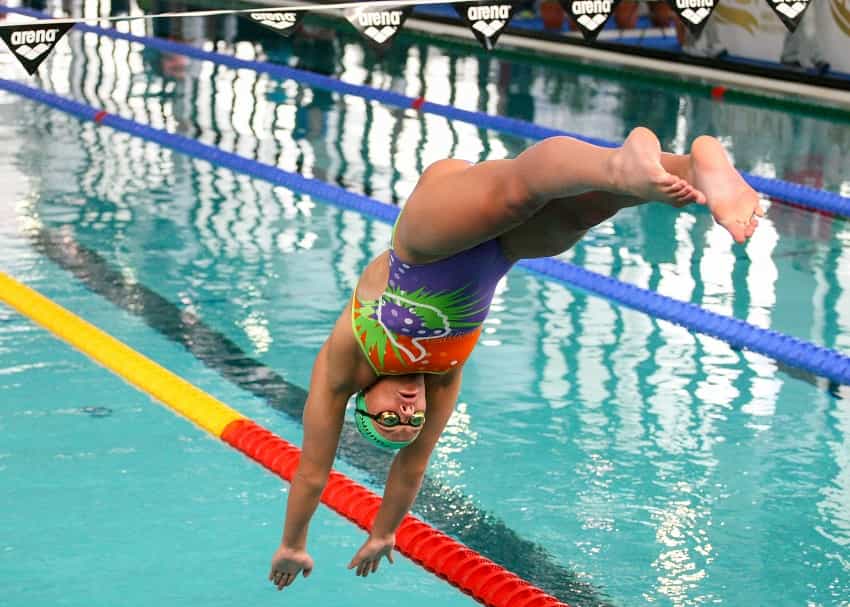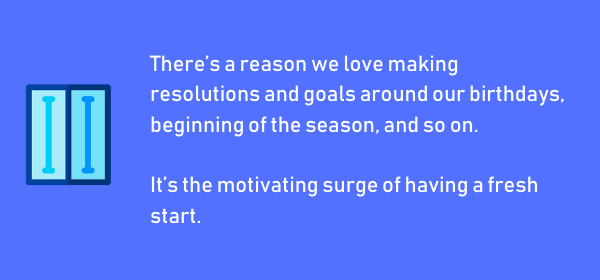The New Year is rolling out, and if you are like most swimmers, you’ve written up some fancy-pants resolutions for you and your swimming.
I’m gonna eat better! Be 18% more committed to my goals! Train like someone stole my lunch money!
You see it in the pool, at the gym, and the fruits and vegetables section at the grocery store: hopped up on the motivation and excitement of a fresh start, many of us are launching ourselves into some form of improvement.
For some, the surge in motivation and commitment is short-lived. The wave of new sign-ups at the local gym thin out when the excitement starts to wear off. After a couple weeks, maybe a month, the line-ups for machines and racks at the gym go from mayhem to ma-normal.
But for plenty of resolvers, the resolutions produce lasting change:
- Marlatt and Kaplan (1975) found that 75% of college students stayed true to their resolutions after 15 weeks.
- Norcross et al (1989) found that after one week, 77% of resolvers kept their resolutions. After one month, 55% were still successful, and by six months, 40% of resolvers were holding on to their New Years commitment.
While those numbers are pretty good, here is a better one: People who make resolutions are more than 10x likely to be successful making change compared to those who just think about the change they want.
- Norcross et al (2002) found that 46% of resolvers were “continually successful” after six months while just 4% of nonresolvers (people who wanted to make change—exercise more, eat better, the usual, but didn’t make resolutions) saw change.
Resolutions work because are a fresh start.
(New year, new you!)
At the end of the year you step ahead of the past version of yourself—you know, the version that always pulled on the lane rope, ate like a donkey, skipped morning practices—and feel a surge of confidence and motivation from the “new” you.
We do this kind of thing—setting temporal landmarks—at other times of the year:
Birthdays. Beginning of the season. End of the short course season. Beginning of a new training cycle. End of the month. Even at the end of the day (“Tomorrow’s a new day”).
These temporal landmarks, which help us organize and demarcate passages of time, provide a sense of a new beginning and close off what’s happened previously, like chapters in a book.
When it comes to swimming like a chlorinated helion, temporal landmarks are also a powerful opportunity to unleash a dive-tank worth of motivation and energy at our goals.
Fresh starts are kind of the best
Whether you’re plugging through an Olympic quad, a training cycle, or a plain-old regular week of training, mental baggage piles up.
We miss a workout, bomb a main set, fall short of our expectations. Although there are plenty of moments of excellence along the way, the negative moments are the ones that we tend to dwell on. We hang on to them like it’s the gutter after an all-out 2,000m for time.
The “fresh start effect” is helpful in wiping the mental slate clear. It gives us a mental break, a chance to move on from past mistakes, shed unhelpful behaviors and charge at our goals with renewed optimism.
This is maybe more important than we realize.
Temporal landmarks are a chance to forgive yourself.
Separating yourself from the past allows you to pass some of the blame for your missteps. (“The old me would sandbag main sets and miss morning workouts. That’s not me anymore. New and improved me is all about destroying the main set and attending every practice possible.”)
Fresh starts mean you can forgive yourself for past mistakes. You’ve struggled, fell short, but hey, you know what? That’s okay. Let’s be better moving forward.
The new you has learned from went wrong in the past, and instead of dwelling, you can let go and focus on getting better.
Fresh starts give you a sense of perspective.
Being able to detach from past performances—both good and bad—gives you a gangster opportunity to level-up your self-awareness. Zooming out, you get a better view of what is happening for you in the water.
What’s working, what’s not.
Being locked in the grind doesn’t always provide opportunities for clear-headed evaluation.
A fresh start helps you step back and evaluate what you used to be like and what you can do to change moving forward.
Fresh starts are motivating.
And here’s the biggie.
Knowing what we need to do get better in the water is rarely the problem.
Show up, stay focused, do the work. Basic stuff.
But more difficult than the threshold sets is the resistance we encounter from procrastination, low motivation, and shaky self-control.
Fresh starts give you an invigorating shot of inspiration to be better. Cut loose of the baggage of the past, you are renewed and ready to tackle new challenges.
Fresh starts are flat-out motivating. Like a shot of nitrous oxide, Fast and Furious-style.
When researchers tracked gym visits at a large university in the northeast United States, they found attendance consistently spiked around at the start of the week, month and year. Students were also more likely to hit the gym at the beginning of the semester, after coming back from break, and following their birthday.
With each temporal landmark that passed, they experienced a jolt of motivation to get their butts into the gym.
Power up progress with fresh starts
Feeling a little extra motivated at the beginning of the season, after a swim meet, or even on a Monday morning may not seem particularly ground-breaking.
But being more aware of it means you can use it as a tool for more motivation, more often.
Here are a couple things to try when throwing fresh starts at your swimming:
Set chunk goals.
I’ve always been a big fan of chunking my training into blocks, usually 3-6 weeks at a time.
Committing to training like a boss for this stretch of time is less daunting than trying to commit to going all-out, all-the-time for a full season.
With the end of each chunk, there’s a clear ending and a new beginning waiting on the other side.
Committing to short-term training goals—arranged within the context of your long-term goal—help you stay focused, increase willpower and charge your motivation.
Short term goals allow you to choose your temporal landmarks. Instead of waiting for your birthday, or New Year’s, or the end of the season, you have more chances to experience increased goal commitment and motivation.
Check yourself with regular evaluations.
The big key with making temporal landmarks and fresh starts work is learning from your wins and missteps.
You can have all the fresh starts in the world, but if you are stuck in the same set of mistakes, stepping in the same pile of “oopsies” every go-round, the power of a fresh start is going to wear off.
When you hit reset, make sure you take a moment to step back and see how you can be better moving forward.
Persistence alone isn’t enough. Bouncing back after a tough practice or race is one thing, but if we aren’t learning from our mistakes, we aren’t going to improve.
Take time to perform a quick inventory on the things that work for you and what you can improve upon.
The fresh start works best when you can believe that the new you is going to be better than past you.
More Stuff Like This:
This Mental Training Workbook Will Help You Swim Like a Rock Star This Season. Confused about mental training? Want to unleash pro mode on your swimming this year? Learn how this mental training workbook will change your mindset and help you pummel your PB’s this season.
Why You Should Be Grading Your Effort After Practice. One of my favorite ways to stay consistent and accountable in practice is this simple technique. Takes about three seconds, and will keep you honest about the effort in the water.















